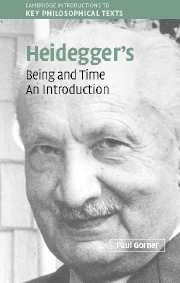Preface
Published online by Cambridge University Press: 05 June 2012
Summary
My aim in writing this book is indicated by its title. I have tried to produce an introduction to Being and Time, rather than a page-by-page commentary. As well as being a very difficult book, Being and Time is also a very long book (though only half the length Heidegger originally intended). So it would have been counter-productive to produce an introduction of similar dimensions. What I have attempted to do is to convey the essence of the work, while at the same time attending to its detail. Inevitably I have had to be selective. It has not been my intention to present a particular interpretation of Heidegger (though by its very nature writing about philosophy is interpretive). There are, however, a number of considerations which have guided my approach. At this stage in his philosophical career Heidegger described himself as a phenomenologist. I have found it illuminating to keep in mind the relationship between Heidegger's conception of phenomenology and that of its founder, Husserl (though the main emphasis is on the differences between Husserl's reflective phenomenology of consciousness and Heidegger's hermeneutic phenomenology of what he calls Dasein). I have also been concerned to correct the widespread view that Heidegger is simply an existentialist. While there is no denying the pervasive presence of typically existentialist themes in Heidegger it seems to me that to treat him as simply an existentialist is essentially to trivialise his thought and to fail to recognise its significance in the history of western philosophy.
- Type
- Chapter
- Information
- Heidegger's Being and TimeAn Introduction, pp. vi - viiPublisher: Cambridge University PressPrint publication year: 2007

